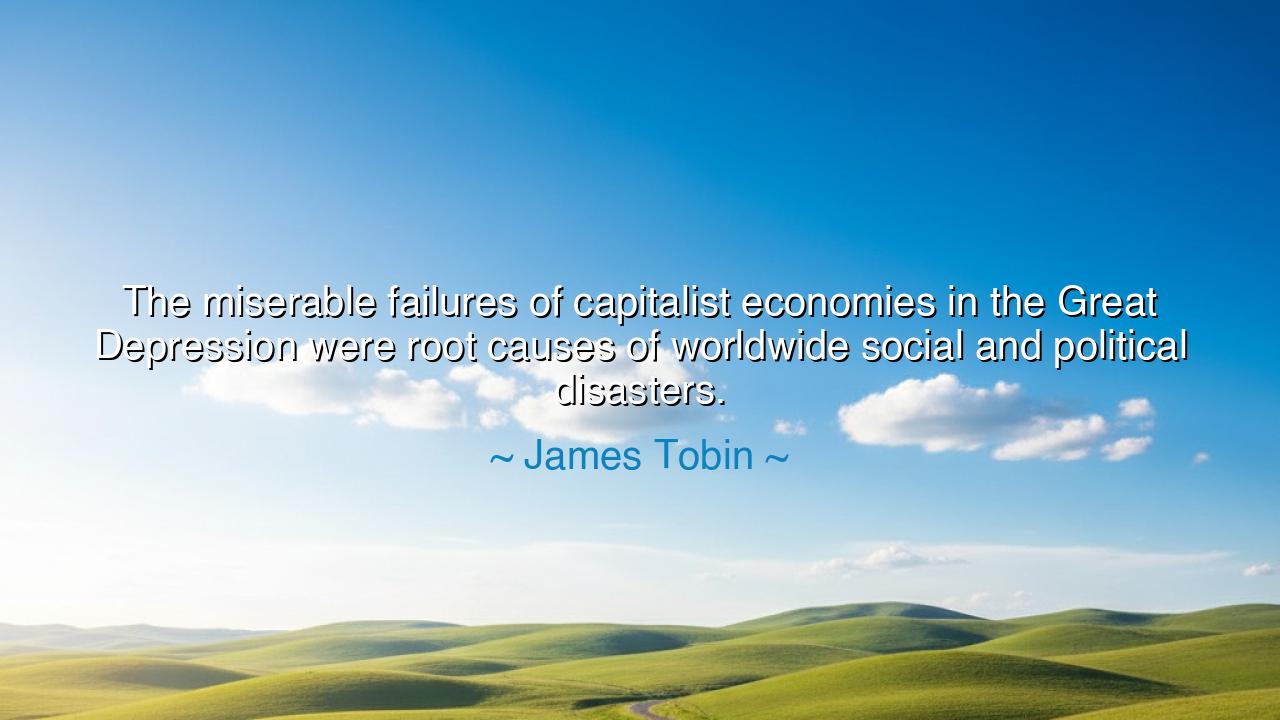
The miserable failures of capitalist economies in the Great
The miserable failures of capitalist economies in the Great Depression were root causes of worldwide social and political disasters.






The great economist James Tobin, a thinker of both intellect and conscience, once wrote: “The miserable failures of capitalist economies in the Great Depression were root causes of worldwide social and political disasters.” In this powerful reflection, Tobin speaks not merely of numbers or markets, but of human suffering and the collapse of trust that follows when greed and imbalance rule unchecked. His words are both historical and prophetic—a warning that when economic systems forget their moral duty to humanity, the very fabric of civilization begins to unravel.
The Great Depression, which began in 1929, was more than a financial calamity—it was a wound upon the soul of the modern world. Banks fell, fortunes vanished, and millions were cast into despair. Once-proud nations watched their people stand in breadlines, hungry and humiliated. In America, farmers lost their lands; in Europe, factories closed and hope itself became a rare commodity. Tobin, who lived through this age, understood that capitalism, when left unbridled, can devour its own children. The market, meant to serve the people, had become their master—and its failure spread not only poverty, but chaos and rage across the earth.
From that economic despair arose the monstrous tides of extremism. In Germany, a nation crippled by inflation and humiliation, Adolf Hitler rose to power, promising strength to the broken and vengeance to the disillusioned. In many lands, democracy itself faltered, for what use is freedom to those who cannot eat? The lesson Tobin saw was clear: the failure of economies to protect their people does not remain an economic matter—it becomes a moral and political catastrophe. The collapse of markets can give birth to the collapse of nations, and from hunger can grow hatred, war, and tyranny.
Yet Tobin’s words are not only an indictment—they are a call to wisdom. He reminds us that economics is not an abstract science, but a branch of human ethics. Every policy, every trade, every profit affects lives. To the ancients, the marketplace was sacred, for it was where community and trust were built. When that trust is broken—when greed outweighs compassion—the market becomes a battlefield. Tobin, like the philosophers of old, sought to restore balance to this sacred exchange. His vision of a “Tobin Tax”—a small levy on financial transactions—was not born of envy, but of justice: a way to curb speculation and return wealth to the common good.
Think also of Franklin D. Roosevelt, who, in those same dark years, declared war not on nations, but on despair itself. Through the New Deal, he wove a safety net for the broken, giving work, dignity, and hope to millions. His leadership proved Tobin’s truth: that when economies serve humanity, society is strengthened; but when humanity serves economies, the soul of civilization withers. The New Deal did not merely rebuild industry—it restored faith in the idea that government, when guided by compassion, could be the guardian of the common man.
The meaning of Tobin’s words extends far beyond the past. Even today, when markets soar and crash with merciless rhythm, his warning remains alive: no system, however efficient, can survive if it abandons fairness and empathy. The failures of capitalism are not inevitable; they are born when profit is placed above people, when competition is untempered by conscience, and when the powerful forget their debt to the weak. A society that measures its worth in wealth alone is a house built upon sand, destined to collapse under the weight of its own indifference.
The lesson is timeless: wealth without wisdom breeds ruin. Every age must guard against the arrogance that comes with prosperity, and every citizen must remember that economics is not the study of money—it is the study of human welfare. Practical action: live with conscience in your labor and your commerce. Support systems that uplift rather than exploit. Demand that your leaders build economies rooted in justice, not greed. For when the strong share their strength, when the market serves the many and not the few, then the disasters Tobin warned of shall never rise again.
Thus, let Tobin’s words stand as both remembrance and vow: “The miserable failures of capitalist economies in the Great Depression were root causes of worldwide social and political disasters.” Let them remind us that balance, fairness, and compassion are not luxuries of the heart—they are the foundations of peace. When we honor them, we build not only prosperous nations, but a world worthy of the dignity of humankind.






AAdministratorAdministrator
Welcome, honored guests. Please leave a comment, we will respond soon